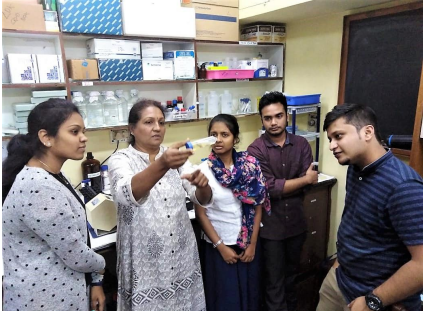CSIR - Centre for Cellular & Molecular Biology
Council of Scientific and Industrial Research
The Innovation Engine of India
Date : October 15, 2024

20th Jan, 2022, Hyderabad: Cancer is one of the leading causes of death worldwide and is attached to economic burden and social stigma. The quest to find plausible therapeutic interventions to replace non-specific chemo drugs has recently led to the development of novel strategies to combat cancer. RNA interference (RNAi), a gene silencing approach, is a promising tool for targeted and focused therapy for chronic diseases like cancer. The lack of safe and effective delivery methods for RNAi molecules is one of the key challenges against using RNAi-based therapy in biological systems.
Dr. Lekha Dinesh Kumar and her group at CSIR-CCMB, in collaboration with the Polymer Science and Engineering Division at CSIR-NCL have developed nano-curcumin structures (derived from turmeric) to encapsulate the RNAi (Ephb4 shRNA) and other molecules that aid in targeting specific tissues. The proposed bio-drug is non-toxic, bio-compatible with a higher uptake efficiency, and shows effective site-specific delivery with regression of tumors in two different mouse models of colon and breast cancer. “The use of curcumin, a well-known nutraceutical with high anti-cancer and anti-inflammatory properties with RNAi showed tumor retardation with six months survival in aggressive models of colon and breast cancer,” says Dr. Kumar. This work has been published in the journal Nanoscale.
In another study with the School of Nanosciences, Central University Gujarat and Centre for Advanced Materials and Industrial Chemistry, RMIT Australia, they designed an eco-friendly and pH-responsive dietary fibre inulin-based nanodevice to target colon cancer. This device suggests the possibility of substituting synthetic substances with natural compounds in bio-drug formulations for better bio- degradability, tissue accumulation, and lesser toxicity. The results from this work have been published in the journal Nanomedicine.
Dr. Kumar says, “In our studies, we have demonstrated that RNAi combined with appropriate targeting agents and encapsulations made of natural biomaterials have high translational capacity in mice models of cancer. This group of bio-drugs can revolutionize the field of cancer therapeutics in the future. It should be assessed in other cancer model systems to bring out the utility of these therapeutics in the clinical trials.”
 Advertisement no 07/10 for the post Junior Scientist.
Advertisement no 07/10 for the post Junior Scientist.
 List of shortlisted candidates for the temporary positions against CCMB Web Notif.No.0724/B- [26-08-2024]
List of shortlisted candidates for the temporary positions against CCMB Web Notif.No.0724/B- [26-08-2024]
 Result of selected candidates for the temporary positions against CCMB Web Notif.No.0724/A - [21-08-2024]
Result of selected candidates for the temporary positions against CCMB Web Notif.No.0724/A - [21-08-2024]
 Notification of Schedule for Trade Test and Downloading of Admit Cards for the posts of Gr. II (1)/Technician (1) against Advt.No:01/2021 - [19-08-2024]
Notification of Schedule for Trade Test and Downloading of Admit Cards for the posts of Gr. II (1)/Technician (1) against Advt.No:01/2021 - [19-08-2024]
 List of selected candidates for the temporary positions against CCMB Web Notif.No.0624/A - [14-08-2024]
List of selected candidates for the temporary positions against CCMB Web Notif.No.0624/A - [14-08-2024]
 List of shortlisted candidates for the temporary positions against CCMB Web Notif.No.0724/A - [02-08-2024]
List of shortlisted candidates for the temporary positions against CCMB Web Notif.No.0724/A - [02-08-2024]
 Notification No.0824/A for various temporary positions on contractual basis- [02-08-2024]
Notification No.0824/A for various temporary positions on contractual basis- [02-08-2024]
 Notification No.0724/B for various temporary positions on contractual basis - [29-07-2024]
Notification No.0724/B for various temporary positions on contractual basis - [29-07-2024]
 List of shortlisted candidates for the temporary positions against CCMB Web Notif.No.0624/A- [19-07-2024]
List of shortlisted candidates for the temporary positions against CCMB Web Notif.No.0624/A- [19-07-2024]
 List of Provisionally empanelled candidates for Engagement as Project staff Vide Notif.No.2024/1 - [15-07-2024]
List of Provisionally empanelled candidates for Engagement as Project staff Vide Notif.No.2024/1 - [15-07-2024]